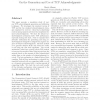Free Online Productivity Tools
i2Speak
i2Symbol
i2OCR
iTex2Img
iWeb2Print
iWeb2Shot
i2Type
iPdf2Split
iPdf2Merge
i2Bopomofo
i2Arabic
i2Style
i2Image
i2PDF
iLatex2Rtf
Sci2ools
121
click to vote
CCR
1998
1998
On the generation and use of TCP acknowledgments
This paper presents a simulation study of various TCP acknowledgment generation and utilization techniques. We investigate the standard version of TCP and the two standard acknowledgment strategies employed by receivers: those that acknowledge each incoming segment and those that implement delayed acknowledgments. We show the delayed acknowledgment mechanism hurts TCP performance, especially during slow start. Next we examine three alternate mechanisms for generating and using acknowledgments designed to mitigate the negative impact of delayed acknowledgments. The rst method is to generate delayed ACKs only when the sender is not using the slow start algorithm. The second mechanism, called byte counting, allows TCP senders to increase the amount of data being injected into the network based on the amount of data acknowledged rather than on the number of acknowledgments received. The last mechanism is a limited form of byte counting. Each of these mechanisms is evaluated in a simulated...
CCR 1998 | Delayed Acknowledgment Mechanism | Delayed Acknowledgments | TCP Acknowledgment Generation |
Related Content
| Added | 21 Dec 2010 |
| Updated | 21 Dec 2010 |
| Type | Journal |
| Year | 1998 |
| Where | CCR |
| Authors | Mark Allman |
Comments (0)

